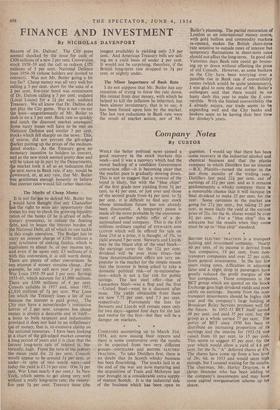Company Notes
By CUSTOS
WHILE the better political news caused a good recovery in the stock markets this week—and it was a recovery which had the moral backing of a confident Government conversion offer—it is becoming clear that the market pace is gradually slowing down. This is not to suggest that a reversal of the trend is likely, but with the "blue chips" of the first grade now yielding from 33 per cent. to 43 per cent. or just over and those of the second grade from 41 per cent. to 5/ per cent. it is difficult to find any stock whose immediate future has not already been discounted. A temporary pause is made all the more probable by the announce- ment of another public offer of a de- nationalised steel company. This is the £10 millions ordinary capital of STEWARTS AND LLOYDS which will be offered for • sale on June 21st at a price, it is thought, of 35s. to yield around 7 per cent. Stewarts and Lloyds may be the bluest chip of the steel block— the earnings cover for the 121 per cent. dividend will be over three times—but these denationalisation offers are very un- popular in the market for the simple reason that the investor is being asked to take a domestic • political risk—of re-nationalisa- tion—which is not a fair risk for public savings. The last steel offer—that of Lancashire Steel—was a flop and the first —United Steel—went to a discount after issue. The yields obtainable from them are now 7.75 per cent. and 7.3 per cent.
respectively. Fortunately the lists for Stewarts and Lloyds will remain open only for two days—against four days for the last and twelve for the first—but they will be a damper on markets.
COMPANIES accounting up to March 31st, 19,54, are. now issuing their reports and there is some controversy over the results to be expected from two very different groups—DISTILLERS and BRITISH ELECTRIC TRACTION. To take Distillers first, there is no doubt that its Scotch whisky business has been flourishing. The stocks laid in at the end of the war are now maturing and the acquisition of Train and McIntyre last year brought in a considerable extra supply of mature Scotch. It is the industrial side of the business which has been open to
question. I would say that there has been some recovery in the industrial alcohol and chemical business and that the plastio company in which Distillers has an interest —B.X. PlastiCs—turned the corner in the last three months of the trading year. Distillers last paid 223 per cent. out of earnings of 323 per cent. and as it remains predominantly a whisky company there is a reasonable chance that it will increase its final dividend to make 25 per cent. for the year. Some optimists in the market are going for 271 *per cent., but taking 25 per cent. as more likely the yield at the current price of 21s. for the 4s. shares would be over 4/ per cent. For a "blue chip" this is adequate but the results when they come must be up to " blue chip" standard.
BRITISH ELECTRIC TRACTION is. a transport holding and investment company. Nearly 60 per cent. of its income is derived from 'bus companies, 19. per cent. from non- transport companies and over 22 per cent. from general investments. In the last few years rising costs, difficulties in adjusting fares and a slight, drop in passengers have greatly reduced the profit margins of the 'bus companies. Those companies in the BET group which are quoted on the Stock Exchange give high dividend yields and poor yields on earnings. Income from the non- transport investments should be higher this year and the company's large holding in Broadcast Relay Services promises well for the future. In 1952-53 BET itself earned 48 per cent. and paid 35 per cent. but the group as a whole earned 77 per cent. The policy of BET since 1950 has been to distribute an increasing proportion of its earnings and the interim for 1953-54 was raised from 10 per cent. to 15 per cent. This seems to suggest 45 per cent. for the year which would allow a yield of 4.8 per cent. for the 5s. "A" deferred shares at 47s. The shares have come up from a low level of 28s. 6d. in 1953 and would seem high enough, but I counsel waiting for the results. The chairman, Mr. Harley Drayton, is a clever financier who has been adding to the company's investments and 'may have some capital reorganisation scheme up his sleeve.


































 Previous page
Previous page